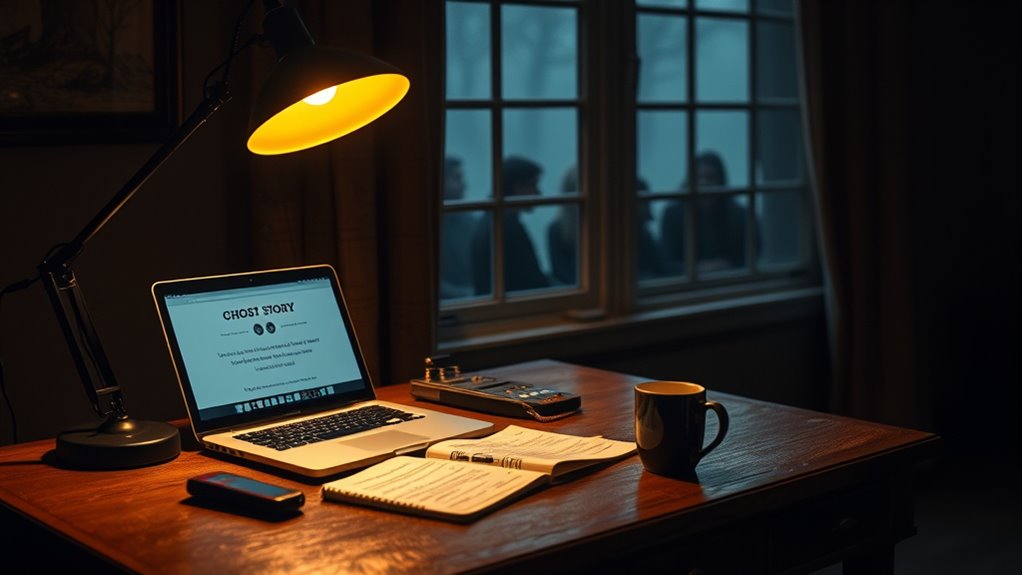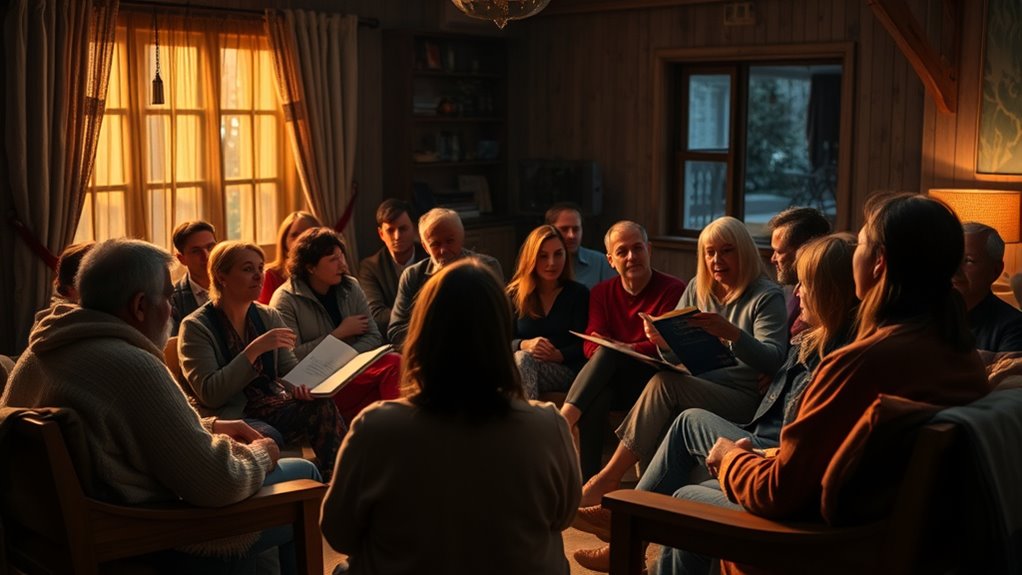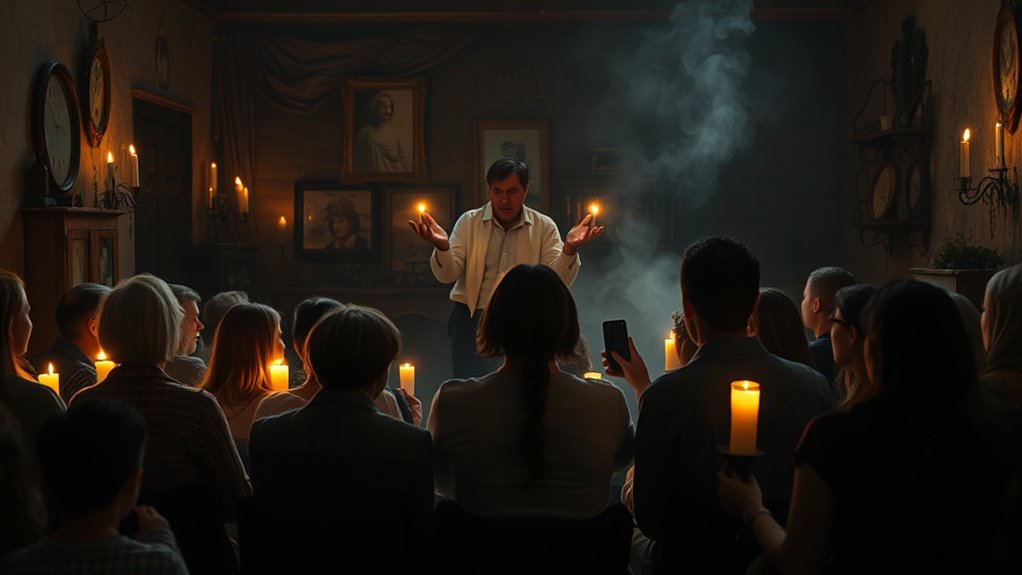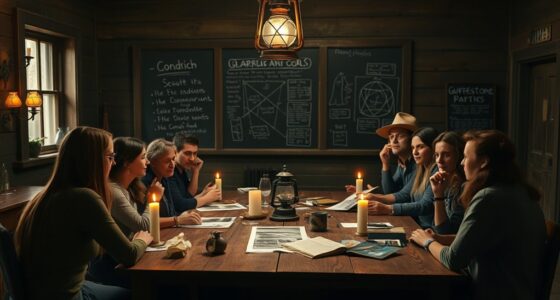To gather ghost stories from your audience responsibly, set clear guidelines that specify what details to include and how stories should be submitted anonymously or securely. Respect their privacy by never demanding personal information and always obtain permission before sharing stories. Verify stories ethically without challenging storytellers and promote a respectful environment where all experiences are valued. If you want to explore effective techniques, there’s more you can do to make sure ethical and meaningful collection.
Key Takeaways
- Provide clear submission guidelines detailing required information, format, and confidentiality assurances.
- Respect privacy by allowing anonymous submissions and securing personal data during collection.
- Verify stories ethically through respectful cross-checking without pressuring storytellers.
- Foster a supportive environment that values all experiences and maintains respectful interactions.
- Obtain explicit permission before sharing stories, and avoid sensationalizing or distorting narratives.
Establish Clear Guidelines for Submission

Have you ever wondered why some ghost stories are easier to collect than others? The key is setting clear guidelines for submission. When you define what details you need—such as date, location, and specific experiences—you make it easier for people to share their stories. Clear instructions reduce confusion and help gather consistent, detailed accounts. Be specific about the format, length, and any supporting materials you prefer, like photos or recordings. This ensures that submissions meet your criteria and are suitable for your collection. It not only streamlines your collection process but also encourages participants to provide complete stories. When people understand what you’re asking for, they’re more likely to contribute meaningful stories that fit your goals. Establishing these guidelines early on ensures a smoother collection process and richer storytelling.
Respect Privacy and Anonymity

Once you’ve established clear guidelines for story submissions, it’s important to prioritize respecting the privacy and anonymity of those sharing their experiences. Always remind your audience that they aren’t required to reveal their identities if they prefer to stay anonymous. Use secure methods for collecting stories, like anonymous online forms or encrypted emails, to protect their information. Avoid asking for personal details that aren’t necessary, and never share stories publicly without explicit permission. Assure storytellers that their privacy is a priority and that their experiences will be handled with confidentiality. Respecting their anonymity fosters trust and encourages more genuine, honest submissions. Additionally, understanding signs of spoilage in lemon juice can help you better inform your audience about safe practices for handling and sharing food-related stories. Ultimately, your goal is to create a safe space where people feel comfortable sharing their stories without fear of exposure or judgment.
Verify and Authenticate Stories Ethically

Ensuring the authenticity of ghost stories is essential to maintaining the credibility of your collection. You should approach verification respectfully, without pressuring storytellers for details they’re uncomfortable sharing. Cross-check details when possible—such as locations, dates, or specific events—without invading privacy. Ask clarifying questions to understand the context better, but avoid challenging their accounts or suggesting doubts. Remember, your goal isn’t to prove or disprove their experiences, but to document stories ethically. If someone’s story seems inconsistent, acknowledge it gently and prioritize their comfort. Always respect their boundaries and avoid sensationalizing or altering their narratives. Authenticity builds trust, so focus on honest, ethical collection practices that honor the storyteller’s experience. Additionally, understanding the importance of verification methods can help you gather stories responsibly.
Promote a Supportive and Respectful Environment

Creating a supportive and respectful environment is essential when collecting ghost stories, as it encourages storytellers to share openly without fear of judgment or ridicule. You should listen actively and show genuine interest, which helps build trust. Acknowledge diverse perspectives and experiences to create an inclusive space. Make it clear that all stories are valued, regardless of their nature or origin. Encourage participants to respect each other’s contributions and avoid dismissive comments. Setting ground rules about confidentiality and kindness fosters a safe atmosphere. Emphasize confidentiality to protect storytellers’ privacy. Remind everyone to listen without interrupting or criticizing. Celebrate the uniqueness of each story and storyteller. Address any disrespectful behavior immediately to maintain trust. Additionally, understanding the importance of color accuracy in storytelling environments can help create a more engaging and authentic sharing experience.
Use Stories Responsibly for Content Creation

When sharing ghost stories in a supportive environment, it’s important to remember that these tales can be powerful tools for content creation. Use stories responsibly by respecting your audience’s comfort and privacy. Avoid sensationalizing or embellishing stories that might cause fear or distress. Instead, focus on authentic storytelling that honors the teller’s experience. Consider the emotional impact and ensure you have permission before sharing personal stories. Using stories thoughtfully builds trust and deepens audience engagement. Additionally, understanding the ethical considerations surrounding AI technology can help guide responsible storytelling practices.
Frequently Asked Questions
How Do I Handle Stories That Might Be False or Exaggerated?
You should approach false or exaggerated stories with tact and respect. Gently ask for more details or clarification to understand their perspective. Remind your audience that stories can be exaggerated or imaginative, and that’s okay. Avoid outright dismissing their stories, but encourage honesty by creating a trusting environment. If needed, politely suggest sharing more credible stories or experiences, ensuring everyone feels comfortable and valued.
What Should I Do if a Story Involves Sensitive or Traumatic Experiences?
Imagine walking through a haunted house; some rooms feel real, others are illusions. If a story involves sensitive or traumatic experiences, approach it with compassion and respect. Let your audience know you value their trust, and consider offering resources or support if needed. Always prioritize their well-being, and avoid sensationalizing or sharing details that might re-traumatize them. Your empathy creates a safe space for genuine storytelling.
Can I Share Stories That Include Identifiable Personal Details?
You shouldn’t share stories that include identifiable personal details without explicit permission. Respect your audience’s privacy and consider anonymizing their stories to protect their identities. If you’re unsure whether to share certain details, ask for their consent first. Remember, sharing personal information without consent can harm trust and cause emotional distress. Always prioritize your audience’s privacy and handle their stories with care and respect.
How Do I Respond to Stories That Challenge My Beliefs or Skepticism?
When stories challenge your beliefs or skepticism, stay open-minded and respectful. You might disagree, but acknowledging their experience shows you value their perspective. Share your thoughts gently, emphasizing curiosity instead of confrontation. Remember, everyone’s perception of the supernatural differs, and your openness encourages honest sharing. By listening without judgment, you create a safe space where your audience feels comfortable, enriching your collection with genuine, diverse ghost stories.
What Legal Considerations Should I Be Aware of When Sharing Ghost Stories?
When sharing ghost stories, you should be aware of copyright laws and privacy rights. Make certain you have permission from storytellers before sharing their stories publicly, especially if they include personal details. Avoid sharing defamatory or false information that could lead to legal claims. Respect confidentiality and avoid revealing identifying information without consent. By doing so, you protect yourself legally and maintain ethical standards while sharing ghost stories.
Conclusion
As you gather ghost stories, remember you’re weaving a delicate tapestry of memories and fears. Handle each tale like a fragile crystal, shining with authenticity and respect. By setting clear boundaries and honoring privacy, you guarantee your storytelling remains a beacon rather than a shadow. When done responsibly, your collection becomes a hauntingly beautiful symphony—echoing the voices of your audience while safeguarding their trust. Let your storytelling be a respectful whisper in the haunted halls of imagination.









